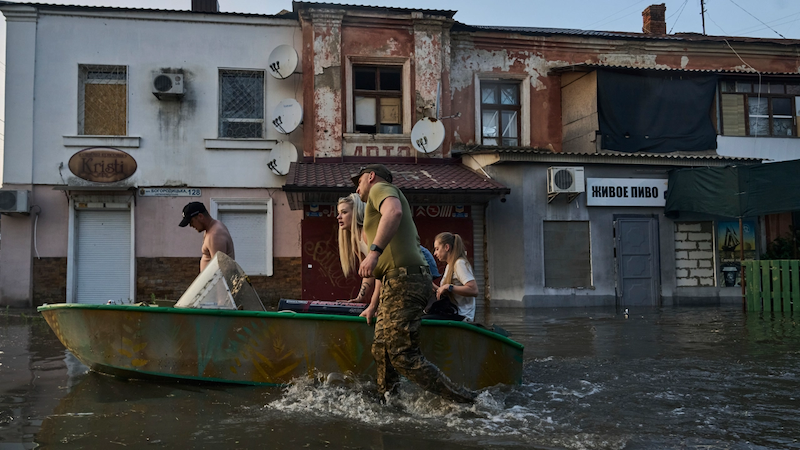
The tragic intersection of the war on Ukraine and the battle against climate change
By Tara Sonenshine, Professor of Public Diplomacy at The Fletcher School
Rushing water from the breach of the Dnieper River in Ukraine has forced thousands of citizens, already beleaguered by war, to evacuate their homes, seek shelter on higher ground and help others get to safety from rising waters, often with motorized boat rescues.
War condemns everyone: People in Russia-controlled territory in Ukraine and in the areas around Kherson, are suffering from flooding, contaminated water and hazardous environmental conditions.
In addition, Ukraine faces a looming disaster with the nearby Zaporizhzhia nuclear power plant, which is currently not operational but must keep its reactors cool to avoid a Chernobyl-like event. The International Atomic Energy Agency, which monitors nuclear activity, issued a statement saying there is no immediate risk to the nuclear power plant but that they will continue to monitor the situation, given the reliance of the facility on the reservoir where the dam once stood.
The topic of war is difficult — a grim reminder that conflicts emerge by dint of human behavior. The phenomenon is often that of a boiling pot. Conflict begins as a competition over resources like land, water or food and escalates as factions within a country begin feuding — or, as in the case of Russia, when an aggressive leader makes a play for resources. Identity and history become bound up with escalating grievances. Common to many conflicts are historical claims over sovereignty animated by the human desire for power: political, economic, military or personal.
As the leading theorist on conflict, John Paul Lederach of the University of Notre Dame reminds us, conflict is part of life and human relations. He argues that conflict, even in its most intractable form, can still become ripe for intervention, mediation and ultimate transformation to peacebuilding.
But until that happens, the war in Ukraine will wreak havoc on all of us.
One underappreciated dimension of this conflict is its impact on climate. At a time when the impact of Canadian fires is being felt in the United States, weather is very much on our radar.
The war in Ukraine is deepening the climate crisis, as greenhouse gas emissions are running at record-high global levels. As citizens, we often overlook the global consequences of war in terms of the air all of us breathe. But scientists are tracking it.
According to a new report by “carbon accountants” based in Europe, the war triggered a net increase of 120 million tons of greenhouse gases in its first year. That comes about as military hardware is concentrated on the battlefield and energy usage shifts throughout the continent. Explosions, shelling, drone attacks and the destruction of plants and equipment, particularly in the summer, are incendiary. Predictions are that forest fires will spread, and that even after the war ends, the reconstruction effort will tax our climate.
And the climate change has not been limited to Ukraine. Methane emissions released after the leaks from Russian gas pipelines in November increased pollution levels in Europe.
Of course, the greatest threat to the planet from the war in Ukraine is a nuclear disaster or the use of nuclear weapons by Russia.
Russia still has a stockpile of approximately 4,489 nuclear warheads assigned for use by long-range strategic launchers and shorter-range tactical nuclear forces, according to the Bulletin of the Atomic Scientists. Ukraine lost its nuclear weapons three decades ago, after the fall of the Soviet Union, in return from security guarantees that proved hollow. One must imagine there is some regret on the part of Ukrainians who now live with saber-rattling by Russia.
As the U.S. government and NATO continue their deep support for the mission in Ukraine, it might be time for the messaging to pivot from defending a democracy to defending the planet. Environmental hazards, nuclear nightmares and the cost of war stand to make public opinion everywhere increasingly hostile to Moscow, as opposed to the potential loss of attention and interest that long wars engender — especially this one.
(This post was republished from The Hill.)
